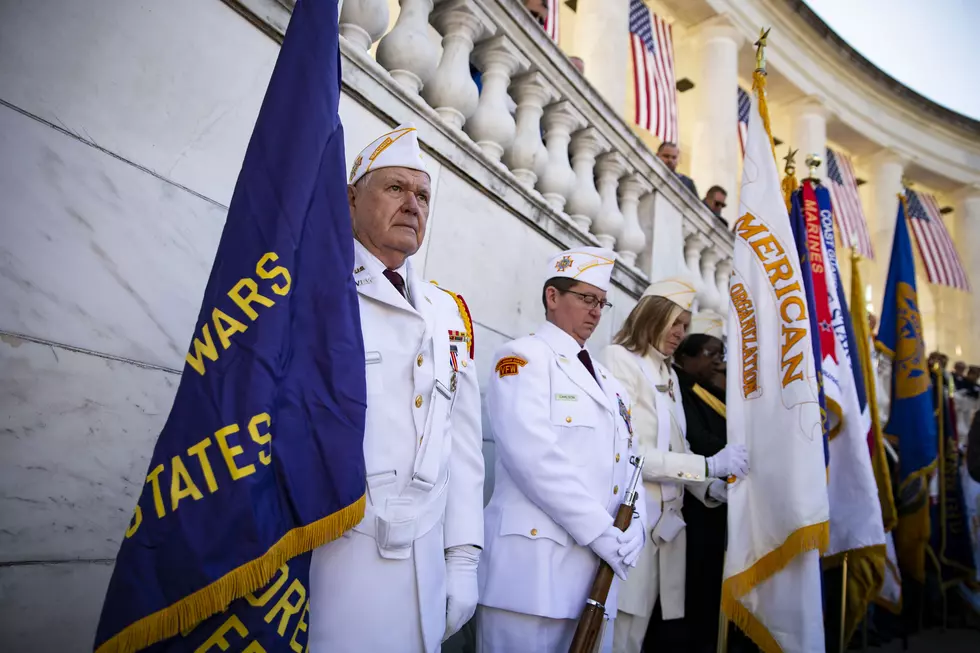![Veterans With PTSD – Does the VA Overprescribe Meds to Returning Vets? [POLL]](http://townsquare.media/site/385/files/2013/11/drugs2-300x225.jpg?w=980&q=75)
Veterans With PTSD – Does the VA Overprescribe Meds to Returning Vets? [POLL]
Question- and it’s especially pertinent on Veterans Day.
Does the VA treat one disorder by creating another?
In other words, when our returning veterans come home with a variety of ailments, not the least of which is Post Traumatic Stress; are doctors at the Veteran’s Administration overprescribing medications for them?
I started to take calls on this the other night and spoke to one vet who told me pretty much what you’ll see in the following piece from the Wall Street Journal.
Desperation drove Timothy Fazio, a former Marine, to turn up around midnight at a veterans' hospital near Boston. His post-traumatic stress disorder was causing flashbacks and blackouts. He had leapt from a balcony.
And he had overdosed, twice, on painkillers originally prescribed for a hand injury suffered in Iraq."I want detox," Mr. Fazio told doctors that night in 2008, his medical files say.
After a week of withdrawal, Mr. Fazio checked himself out of the Veterans Health Administration hospital—and was given 168 pills of the same opium like drug he was already addicted to, according to his files, which The Wall Street Journal has reviewed. The next day, the hospital gave him another 168 pills.
PTSD and painkillers are the twin pillars of a new mental-health crisis in America. Many of the more than two million Americans who served in Iraq or Afghanistan suffer, as Mr. Fazio does, from a mixture of pain and PTSD. The VA treats many of them with powerful opioid painkillers for their pain. But opioids can be a combustible mix with mental illness because of a heightened addiction risk.
Effectively, some critics say, it amounts to treating mental illness with addictive narcotics.
A study by a VA researcher found that veterans with PTSD were nearly twice as likely to be prescribed opioids as those without mental-health problems. They were more likely to get multiple opioid painkillers and to get the highest doses. Veterans with PTSD were more than twice as likely to suffer bad outcomes like injuries and overdoses if they were prescribed opioid painkillers, the study found.
In Mr. Fazio's case, between 2008 and 2011 the VA prescribed him more than 3,600 pills containing oxycodone, a narcotic painkiller from the same family as heroin and morphine, his records show. He overdosed a total of six times.
"I was always a tough kid, but I feel like this has been the toughest fight of my life," Mr. Fazio said in March, after a spell of homelessness that saw him sleeping in an ATM lobby. "I don't know if I'm going to win it."
The number of vets with both PTSD and pain isn't known. But some 30% of Iraq and Afghanistan veterans under VA care have PTSD, VA figures show, and more than half suffer chronic pain.
Last year, more than 50,000 veterans were treated by the VA for serious problems associated with opioid use, nearly double the number a decade earlier, according to VA data. By contrast, the total number of VA patients grew 30% over that time. The number of opioid prescriptions written by the VA has risen by 287% between 1999 and 2012, according to data obtained by The Wall Street Journal through an open-records request.The rate of accidental drug overdoses among VA-enrolled veterans is nearly twice that of the U.S. population as a whole, according to a different study led by a VA doctor, which controlled the results for age and gender. Opioid medications were the leading cause.
So does the VA, in its desire to get vets on their feet, overprescribe meds, including ones that are highly addictive?
Given the numbers cited above, one can safely say “yes!”
And in the case of Fazio, it’s mindboggling to me that in order to treat his PTSD and addiction, he was given a cocktail of drugs that counteracted with each other.
In February 2008, Mr. Fazio says, he realized he was addicted. According to his parents and his medical records, he flushed his drugs down the toilet and spent a week vomiting from withdrawal. His notes say he felt insects crawling under his skin.
He turned to the VA for help. "After reading online about the addiction potential," his records say, "he was determined that no medication would have control over his body."
He was released after a week. His records show that doctors, recommending that he withdraw slowly, sent him home with 30 pills containing oxycodone.In September 2008, Mr. Fazio decided again he needed to come off the painkillers, and made his midnight visit to the VA hospital near Boston. A week later, he checked himself out, against doctors' advice.
His records show he was given 28 days' supply of a drug containing oxycodone that day, and another 28 days' supply the day after. The psychiatrist appears to have agreed to issue the drugs after learning Mr. Fazio had been accepted into a mental-health program.
VA doctors also prescribed antianxiety drugs including generic Klonopin and Ativan. According to studies and government guidelines, these drugs put patients at greater risk of overdose when used with opioids.
And unfortunately, on and on the story goes, until he was kicked out of his parents home, moved in with another former Marine, who himself was an addict, and nearly died until he met his present girlfriend.
And while not made whole, he struggles everyday with PTSD, for which doctors still prescribe the same detrimental cocktail.
He’s since flushed them down the toilet and struggles with each passing day.
Where his particular story ends, we won't know, but it wouldn't surprise me if you or a family member are or have gone through the same ordeal.
In your opinion, do you feel the VA overprescribes painkillers and antianxiety medications for returning vets with PTSD?
More From New Jersey 101.5 FM









